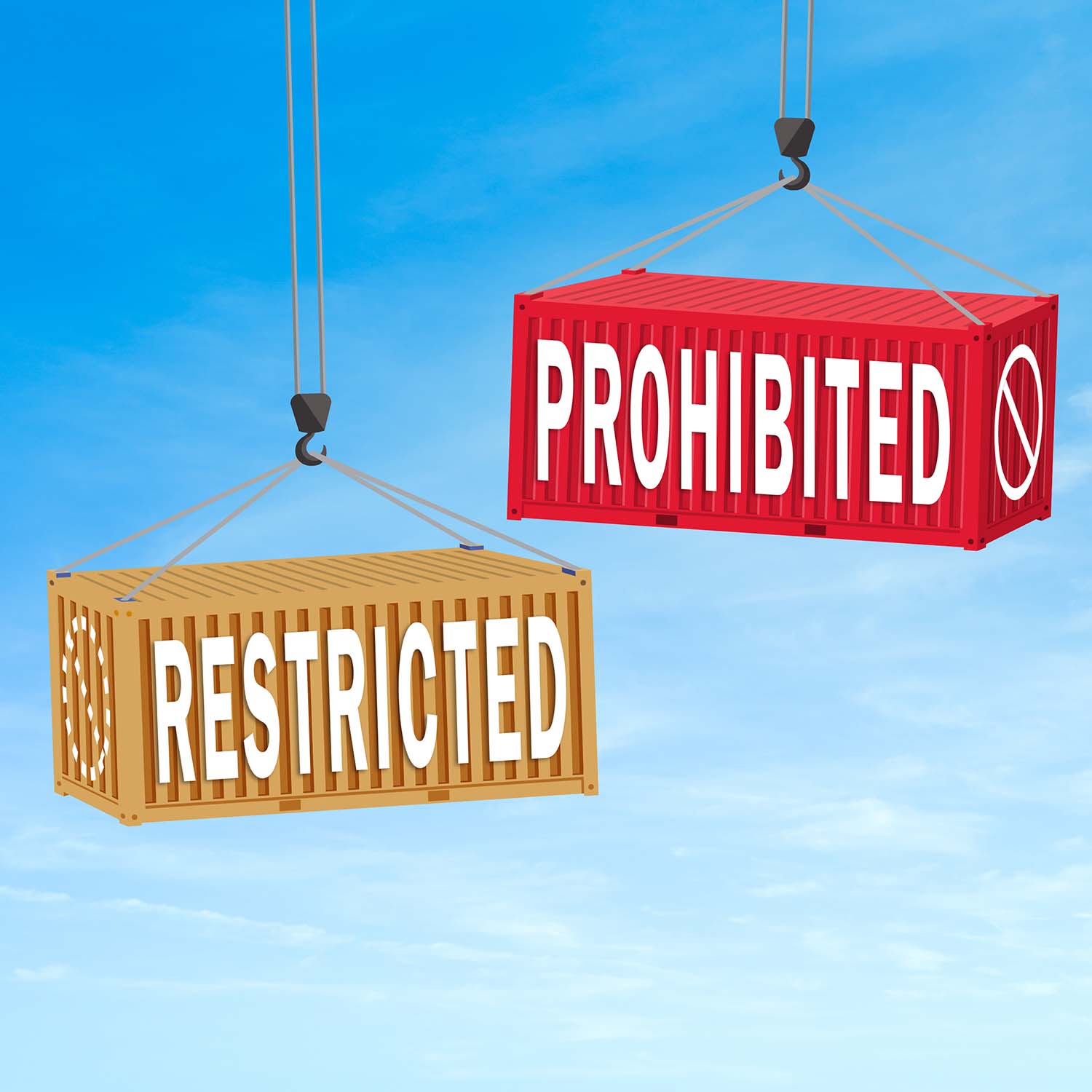Import: Restricted and Prohibited
Restrictions and Prohibitions
All countries restrict or prohibit the import and export of certain articles based upon:
- Concerns for health, safety, and public morality (e.g., foodstuffs, agricultural products, live animals, biologic materials, pharmaceuticals, illicit drugs, chemicals, hazardous products, and materials deemed indecent).
- Protection of the physical and economic security of the state (e.g., arms, armaments, dual-use technology, radio and television transmitters and receivers, radioactive materials, seditious materials, and currency).
- Economic protection or subsidization of domestic industry (e.g., non-tariff barriers to trade for imports and control of natural resources for exports).
- Enforcement of provisions of multi-lateral trade agreements (e.g., those designed to protect endangered and threatened species of animals and plants and those designed to protect copyright, patent, and trademark holders against infringement).
Restricted Articles
Metallic Waste or Scrap
Import of any form of metallic waste or scrap will be subject to the condition that it will not contain hazardous, toxic waste, radioactive contaminated waste, scrap containing radioactive material, or any type of arms, ammunition, mines, shells, live or used cartridges, or any other explosive material in any form, either used or otherwise.
Secondhand Vehicles
Import of secondhand vehicles is restricted; therefore, they should not be older than three years, and have a minimum residual life of five years.
Other Restricted Articles
- Appliances such as pistols, pistol pencils, and pistols for discharging gas
- Arms and military equipment
- Articles of gold or silver
- Coins or ingots worth more than Rs.65, unless for ornament purposes
- Coins, bank notes, currency notes, and traveler's checks
- Consumer electronic items except hearing aids and lifesaving equipment
- Jewelry
- Other valuable articles
- Precious stones
- Radioactive materials
- Securities payable to the bearer
Prohibited Articles
Goods that damage the environment or wildlife, certain defense items, and goods threatening internal security, public order, and various standards of decency and morality are banned from import to India.
Animals and Articles of Animal Origin
- Tallow, fat, and oils of animal origin
- Lard stearin, lard oil, oleostearin, oleo oil, and tallow oil not emulsified, mixed, or otherwise prepared
- Animal rennet
- Unmanufactured ivory
- Tiger-cat skins
- Animals of endangered species and animal products such as meat and edible meat offal, fresh, chilled or frozen, of wild animals falling under tariff line 0208
- Due to the outbreak of Transmissible Spongiform Encephalopathy (TSE) diseases, the Ministry of Agriculture, Department of Husbandry and Dairying prohibits the import of the following:
- Live cattle, buffalo, sheep, and goats
- Bovine, ovine, and caprine embryos or ova
- Fresh meat and meat products
- Tissue, organs, and meat and bone meal (MBM) of ruminant origin
- Pet food products or ingredients of ruminant origin.
- To ensure food safety and protect domestic and wild birds from Highly Pathogenic Avian Influenza, the Ministry of Agriculture, Department of Animal Husbandry and Dairying has set an import ban on livestock and their products, domestic and wild birds, including:
- Captive birds, ducks, turkeys, day-old chicks, and other newly-hatched avian species
- Hatching eggs, eggs and egg products
- Semen of domestic and wild birds
- Meat and meat products from avian species, including wild birds, feathers, products of animal origin intended for use in animal feeding or for agricultural or industrial use
- Live pigs and meat products
- Pathological material and biological products from birds.
Country Prohibitions
- Lupin seeds from Australia
- US poultry, poultry products, live horses, pet food, pork, swine, and many dairy products
Note: The above information is subject to change. Importers and exporters are advised to obtain the most current information from a customs broker, freight forwarder, logistics professionals, or local customs authorities.
Source: Central Board of Indirect Taxes and Customs
Article written for World Trade Press by Taylor Holloran, Jennifer Goheen, and Nina Bellucci.
Copyright © 1993—2025 World Trade Press. All rights reserved.

 India
India 